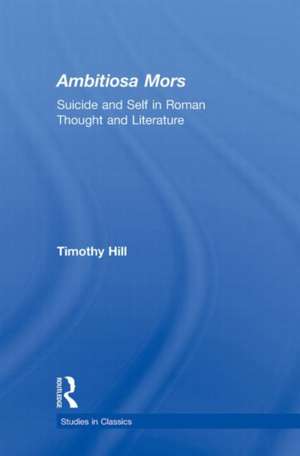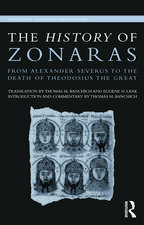Ambitiosa Mors: Suicide and the Self in Roman Thought and Literature: Studies in Classics
Autor T. D. Hillen Limba Engleză Paperback – 6 ian 2011
| Toate formatele și edițiile | Preț | Express |
|---|---|---|
| Paperback (1) | 327.26 lei 6-8 săpt. | |
| Taylor & Francis – 6 ian 2011 | 327.26 lei 6-8 săpt. | |
| Hardback (1) | 1012.34 lei 6-8 săpt. | |
| Taylor & Francis – 11 aug 2004 | 1012.34 lei 6-8 săpt. |
Preț: 327.26 lei
Preț vechi: 418.69 lei
-22% Nou
Puncte Express: 491
Preț estimativ în valută:
62.62€ • 65.56$ • 51.81£
62.62€ • 65.56$ • 51.81£
Carte tipărită la comandă
Livrare economică 05-19 aprilie
Preluare comenzi: 021 569.72.76
Specificații
ISBN-13: 9780415891189
ISBN-10: 0415891183
Pagini: 348
Dimensiuni: 152 x 229 mm
Greutate: 0.62 kg
Ediția:1
Editura: Taylor & Francis
Colecția Routledge
Seria Studies in Classics
Locul publicării:Oxford, United Kingdom
ISBN-10: 0415891183
Pagini: 348
Dimensiuni: 152 x 229 mm
Greutate: 0.62 kg
Ediția:1
Editura: Taylor & Francis
Colecția Routledge
Seria Studies in Classics
Locul publicării:Oxford, United Kingdom
Recenzii
"it fully realizes its claim to deepen our understanding of ancient suicide by making self-killing practices of the Roman elite of the Early Principate part of the ancient category of good dying, euthanatein in the classical sense." -- Anton J.L. van Hooff, Nijmegen University, Bryn Mawr Classical Review
Cuprins
1. Introduction 2. Cicero 3. Lucretius and Epicureanism 4. Eros , Self-Killing, and the Suicidal Lover in Republican Literature 5. Vergil 6. Ovid 7. Seneca 8. The Concept of the Political Suicide at Rome 9. Lucan 10. Petronius Epilogue: Roman Suicide after Nero
Descriere
In this book, T.D. Hill traces the cultural logic which animated the suicides of Roman aristocrats, describing the meaning and significance of such deaths in their original cultural context. Covering the writing of most major Latin authors between Lucretius and Lucan, this book argues that the significance of the 'noble death' in Roman culture cannot be understood if the phenomenon is viewed in the context of modern ideas of the nature of the self.








































